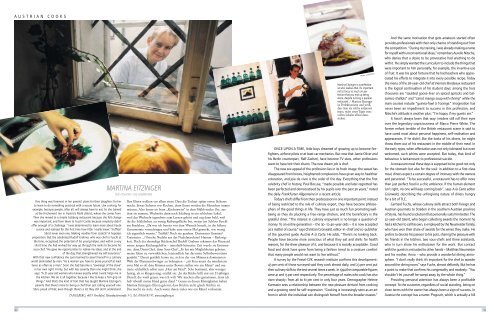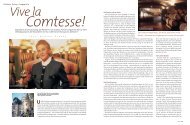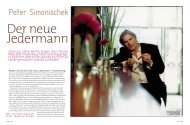Gentle Rebels
Gentle Rebels
Gentle Rebels
Erfolgreiche ePaper selbst erstellen
Machen Sie aus Ihren PDF Publikationen ein blätterbares Flipbook mit unserer einzigartigen Google optimierten e-Paper Software.
AUSTRIAN COOKS<br />
76<br />
One thing was foremost in her parents’ plans for their daughter: for her<br />
to learn to do something practical with a secure future. Like cooking, for<br />
example, because people, after all, will always have to eat. So she trained<br />
at the Kirchenwirt Inn in Austria’s Mühl district, where she comes from.<br />
Then she moved to a simple Salzburg restaurant because she felt change<br />
was important, and from there to Fuschl Castle because simplicity didn’t<br />
offer enough of a challenge. “I was determined to learn more about haute<br />
cuisine and realised for the first time how little I really knew.” Truffles?<br />
She’d never seen one. Making noodles from scratch? A hopeless<br />
proposition. But the celebrated Rudolf Grabner, who was chef in Fuschl at<br />
the time, recognised the potential of his young helper, and within a very<br />
short time she had worked her way up through the ranks to become his<br />
sous-chef. “He gave me opportunities to realise my ideas, and at the end<br />
of the day, that strengthened my self-assurance.”<br />
With that new confidence she soon learned to assert herself in a culinary<br />
world dominated by men. “As a woman you have to prove yourself at least<br />
twice as often as a man.” Soon she had become a “sovereign of the stove”<br />
in her own right. Firmly, but with less severity than one might think, she<br />
says: “A 21-year-old woman who knows exactly what I want helps me in<br />
the kitchen. We do it all together, because I like to keep a firm grip on<br />
things.” And that’s the kind of trait that has taught Martina Eitzinger’s<br />
parents that there’s more to being a chef than just calling yourself one.<br />
She’s proud of that, even though there’s a lot they still don’t understand.<br />
MARTINA EITZINGER<br />
THE FIGHTER / DIE KÄMPFERIN<br />
TANGLBERG, 4655 Vorchdorf, Pettenbacherstraße 3–5, Tel.: 07614/83 97, www.tanglberg.at<br />
Ihre Eltern wollten vor allem eines: Dass die Tochter später etwas Sicheres<br />
macht. Etwas Sicheres wie Kochen, denn Essen werden die Menschen immer<br />
müssen. Also lernte sie beim „Kirchenwirt“ in dem Mühlviertler Ort, aus<br />
dem sie stammt. Wechselte dann nach Salzburg in ein schlichtes Lokal,<br />
weil das Wechseln irgendwie zum Lernen gehört und zog dann bald, weil<br />
ihr die Schlichtheit zu wenig Reibungsfläche bot, weiter ins Schloss Fuschl<br />
am Fuschlsee. „Da war ich bereits von dem Wunsch beseelt, in die höhere<br />
Gastronomie vorzudringen und habe zum ersten Mal gemerkt, wie wenig<br />
ich eigentlich wusste.“ Trüffel? Noch nie gesehen. Drainiertes Gemüse?<br />
Trainiertes …? Frische Nudeln aus der Nudelmaschine? Hmmm – Ratlosigkeit.<br />
Doch der ehemalige Küchenchef Rudolf Grabner erkannte das Potenzial<br />
seiner jungen Küchengehilfin – innerhalb kürzester Zeit wurde sie Entremetier,<br />
dann Demi-Chef, dann Sous-Chef. „Er hat mir Möglichkeiten geboten,<br />
meine Ideen zu verwirklichen, letztendlich hat das mein Selbstbewusstsein<br />
gestärkt.“ Derart gestählt lernte sie, sich in der von Männern dominierten<br />
Welt der Pfannenschwinger zu behaupten – „als Frau musst du mindestens<br />
zwei Mal so oft dein Können unter Beweis stellen wie ein Mann“ und mutierte<br />
schließlich selbst zum „Herr am Herd“. Sehr bestimmt, aber weniger<br />
hantig, als es klingen mag, erzählt sie: „In der Küche hilft mir ein 21-jähriges<br />
Dirndl, die weiß genau, was ich will. Wir machen alles gemeinsam, denn ich<br />
hab’ überall meine Hand gerne drauf.“ Genau an diesen Kleinigkeiten haben<br />
Martina Eitzingers Eltern gelernt, dass Köchin nicht gleich Köchin ist.<br />
Das macht sie stolz. Auch wenn ihnen vieles wie ein Rätsel vorkommt.<br />
Photo: Luzia Ellert<br />
Martina Eitzinger is a perfectionist<br />
who realises that it’s important<br />
not to focus so much on perfection<br />
that you end up being<br />
alone, despite running a popular<br />
restaurant. / Martina Eitzinger<br />
ist Perfektionistin und weiß,<br />
dass man als solche aufpassen<br />
muss, nicht eines Tages trotz<br />
vollen Lokales allein dazustehen.<br />
ONCE UPON A TIME, little boys dreamed of growing up to become firefighters,<br />
airforce pilots or at least car mechanics. But now that Jamie Oliver and<br />
his Berlin counterpart, Ralf Zacherl, have become TV stars, other professions<br />
seem to have lost their charm. The new dream job is chef.<br />
The new sex appeal of the profession lies in its fresh image: the sweat has<br />
disappeared from brows, heightened complexions have given way to healthier<br />
coloration, and joie de vivre is the order of the day. Everything that the first<br />
celebrity chef in history, Paul Bocuse, “made possible and later regretted has<br />
been perfected and democratised by his pupils over the past 30 years,” noted<br />
the daily Frankfurter Allgemeine in a recent article.<br />
Today’s chefs differ from their predecessors in one important point: instead<br />
of being restricted to the role of culinary expert, they have become philosophers<br />
of the good things in life. They have just as much fun promoting wellbeing<br />
as they do plucking a free-range chicken, and the beneficiary is the<br />
grateful diner. “The interest in culinary enjoyment is no longer a question of<br />
money. To an entire generation – the 30- to 40-year-olds – it is now accepted<br />
as a matter of course,” says Christian Grünwald, editor-in-chief and co-publisher<br />
of the gourmet guide Austria A la Carte. He adds, “There’s no looking back.<br />
People have become more conscious of what they eat and drink: for health<br />
reasons, for the sheer pleasure of it, and because it is socially acceptable. Good<br />
food and drink have gone from being a fashion trend to a creature comfort<br />
that many people would not want to live without.”<br />
A survey by the Fessel-GfK research institute confirms this development:<br />
43 per cent of those surveyed said they cook almost daily, and 23 per cent put<br />
their culinary skills to the test several times a week. In 1994 the comparable figures<br />
were 41 and 13 per cent respectively. The percentage of males who cook has also<br />
risen sharply: from 46 to 61 per cent in only four years. Demographer Helene<br />
Karmasin sees a relationship between the new pleasure derived from cooking<br />
and a growing need for self-expression: “Cooking is increasingly seen as an art<br />
form in which the individual can distinguish himself from the broader masses.”<br />
And the same motivation that gets amateurs started often<br />
provides professionals with their only chance of standing out from<br />
the competition. “During my training, I was already making a name<br />
for myself with unconventional ideas,” remembers Aurelio Nitsche,<br />
who denies that a desire to be provocative had anything to do<br />
with it. He simply wanted the curriculum to include the things that<br />
were important to him personally, for example, the inventive use<br />
of fruit. It was his good fortune that he had teachers who appreciated<br />
his efforts to integrate it into every possible recipe. Today<br />
the menu of the 28-year-old chef at Vienna’s Bordeaux restaurant<br />
is the logical continuation of his student days: among the hors<br />
d’oeuvres are “sautéed goose-liver on spiced apricots and balsamico<br />
shallots” and “carrot mango soup with shrimp” while the<br />
main courses include “guinea-fowl à l’orange.” Imagination has<br />
never been an impediment to success in this profession, and<br />
Nitsche’s attitude is another plus: “I’m happy if my guests are.”<br />
It hasn’t always been that way: insiders still roll their eyes<br />
over the legendary capriciousness of Marco Pierre White. The<br />
former enfant terrible of the British restaurant scene is said to<br />
have cared most about personal happiness, self-realisation and<br />
appearances. If he didn’t like the looks of his diners, he might<br />
throw them out of his restaurant in the middle of their meal. In<br />
the early 1990s, when affectation was not only tolerated but even<br />
welcomed, such whims were accepted. But today, that kind of<br />
behaviour is tantamount to professional suicide.<br />
A restaurant meal these days is supposed to be good not only<br />
for the stomach but also for the soul: in addition to a first-class<br />
meal, diners expect a certain degree of intimacy with the owners<br />
and personnel. “To be successful, a restaurant has to offer more<br />
than just perfect food in a chic ambience. If the human element<br />
isn’t right, no one will keep coming back”, says A la Carte editor<br />
Grünwald, describing the unforgiving nature of diners hungry<br />
fora bit of TLC.<br />
Gerhard Fuchs, whose culinary skills attract both foreign and<br />
Austrian gourmets to Straden in the southern Austrian province<br />
of Styria, has found a solution that personally suits him better. The<br />
32-year-old talent, who began collecting awards the moment he<br />
had a kitchen to call his own, is employed by the Neumeister family,<br />
who have won their share of awards for the wines they make. He<br />
prefers to devote his passion to his pots, sharing the pleasure with<br />
his friends in the kitchen, two sous-chefs and three assistants,<br />
who in turn share his enthusiasm for the work. But contact<br />
with the guests is entrusted to other hands – Matthias Neumeister<br />
and his mother, Anna – who provide a wonderful dining atmosphere.<br />
“I don’t really think it’s important for the chef to wander<br />
around the dining room,” says Fuchs, almost defiantly. But he has<br />
a point to make that confirms his congeniality and modesty: “You<br />
shouldn’t let yourself be swept away by the whole thing.”<br />
Providing personal attention has always been a profitable<br />
concept. To the customer, regardless of social standing, being on<br />
close terms with the owner has always been a sign of success. In<br />
Austria the concept has a name: Pogusch, which is actually a hill<br />
77
















